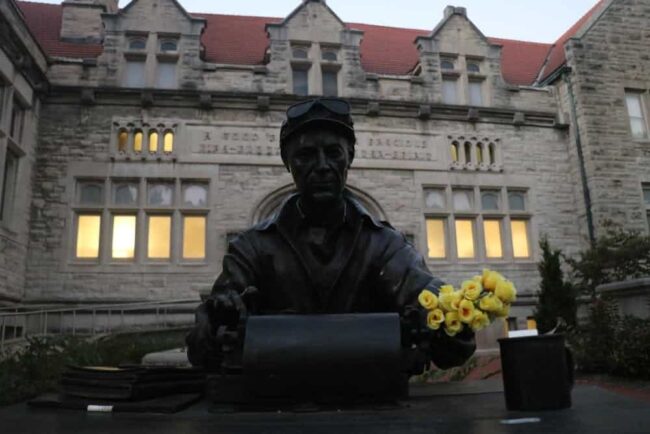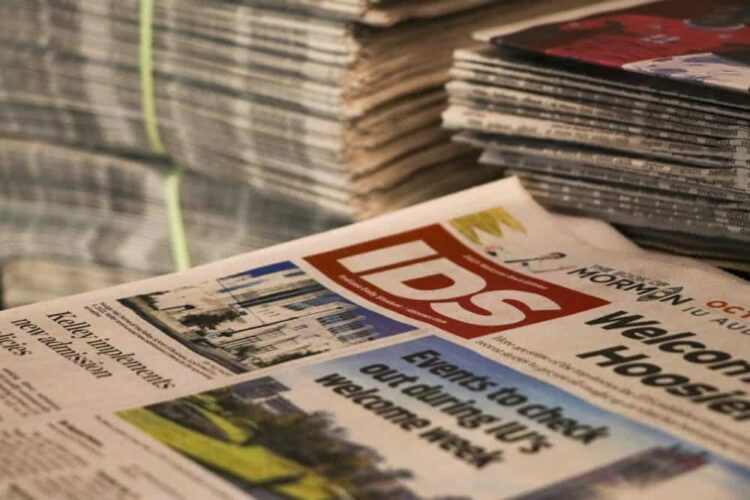
By Steven Hinnefeld
The Indiana Citizen
October 31, 2025
Indiana University has reversed course on its decision to end print publication of the Indiana Daily Student, its award-winning student newspaper, after two weeks of intensive blowback, including accusations of censorship and canceled alumni donations.
IU Bloomington Chancellor David Reingold announced the decision in a letter to the editor published online by the IDS Thursday night.
In his letter, Reingold said the IDS has faced financial challenges for decades and is running an annual deficit of almost $300,000, which, he said, helped lead to the initial decision to suspend the print edition. However, he said the IDS may spend money in its established budget through June 30, 2026, “as the editors see fit – so long as they remain true to their budgetary parameters.”
That means the IDS can resume publishing up to seven special print editions per semester and include news stories in them, IDS editors Mia Hilkowitz and Andrew Miller said in a letter to readers. The special editions are tied to events around campus, such as major sports seasons and homecoming.
Hilkowitz and Miller welcomed the decision, calling it “a win for student journalism, for editorial independence and our fight to bring quality journalism to our community.” But they said much remains to be done to restore trust in the IU administration. They noted that Reingold “stopped short of a full apology to the students and faculty whose lives he’s disrupted.”
Suzannah Evans Comfort, an associate professor and interim director of journalism in IU’s Media School, said she was pleasantly surprised that IU reversed course but pointed out that Reingold had committed to allowing IDS print editions only through June 30.
“I think it’s just a temporary reprieve,” she said Friday. “I believe the expectation is still that the IDS will reduce its costs.”
The controversy erupted on Oct. 14, when David Tolchinsky, the dean of the Media School, fired Jim Rodenbush, who had been director of student media since 2018. Hours later, IU officials announced that print publication of the IDS would cease.
Rodenbush said he was fired because he refused to direct student editors to include only themed content, and no news coverage, in the scheduled-for-print Oct. 16 homecoming edition. (The online version featured in an e-edition a large, red banner headline in all caps on its front page that read “Censored”). Previous special editions had included regular news and sports coverage with themed content in an insert. Telling editors what to include in a print product would violate the 1969 IDS charter as well as the First Amendment’s guarantee of press freedom, Rodenbush said.
“I saw it as censorship from the beginning,” he told The Indiana Citizen in an Oct. 22 interview. “The university is allowed to make business decisions … but those decisions have to be content-neutral.” Rodenbush sued the university this week in U.S. District Court, alleging “blatant violation” of his freedom of speech and due-process rights under federal and state constitutions.

IU officials have refused to comment on Rodenbush’s firing, calling it a confidential personnel matter. Reingold, in his letter to the IDS, admitted the timing and communication of IU’s decisions could have been better but denied attempting to censor the IDS.
“My decision had nothing to do with editorial content of the IDS,” he wrote. “And contrary to what has been posted on social media and published, Indiana University has never attempted to censor editorial content, period. The IDS is, and remains, editorially independent.”
The issues at IU arose just months after Purdue University ended its longtime practice of helping distribute The Purdue Exponent, that university’s student newspaper. While the Exponent’s staff still drops off copies of the paper at Purdue, the change reduced distribution on campus by 30%, publisher Kyle Charters and campus editor Olivia Mapes said in an interview with The Citizen. While the IDS is an auxiliary of Indiana University, the Exponent is independent, published by a nonprofit foundation. It separated from the university in 1968, after the university president tried to fire the student editor.
In solidarity with the IDS, Purdue students printed 3,000 copies of a four-page special edition of the Exponent and distributed them at IU Bloomington on homecoming weekend. The cover included an illustration with the headline “We Student Journalists Must Stand Together.” “The IDS is so similar to us that it hit home really hard,” Mapes said.
An Indiana Citizen email survey of student newspaper editors at other Indiana colleges and universities did not turn up accounts of censorship with one minor exception: At Butler University, Collegian editor-in-chief Caleb Denorme said administration officials invoked university policy to prevent publication of the name of a student accused of plagiarism. Denorme said the disagreement resulted in productive conversations with the Butler College of Communication dean and a pledge to honor the publication’s editorial independence.
At IU, the response to the decision to fire Rodenbush and end IDS print publication was loud and overwhelmingly negative. The controversy received extensive news coverage, including in The New York Times, The Washington Post and The Guardian. Advocacy groups, such as the Foundation for Individual Rights and Expression, the Student Press Law Center and PEN America, denounced IU’s actions as censorship.
Even before the IDS controversy, FIRE’s 2026 College Free Speech Rankings placed IU near the bottom of public universities (and placed Purdue near the top). FIRE called on IU to restore the print version of the IDS and reinstate Rodenbush. “This sort of thing that’s happening at IU is also happening across the country,” Dominic Coletti, FIRE’s program officer for the Student Press Freedom Initiative, said in an interview with The Citizen. “People need to be on the lookout. And people can make a difference.”
IU journalism and Media School faculty and university alumni issued strongly worded statements in support of the IDS. Michael Auslen, president of the IU Student Publications Alumni Association Board, said the university’s actions have been disheartening. But Auslen, who was IDS editor in 2013, told The Citizen the across-the-board support for the paper has been encouraging. “I’m really happy to see it’s not just journalism alumni and IDS alumni,” he said. “We all value the IDS; we value its independence.”
Some alumni expressed their displeasure by withdrawing contributions to the university. Evans Comfort, the journalism professor, estimated that the Media School had lost hundreds of thousands of dollars in the two weeks since the controversy ignited. The Indy Star reported that, university-wide, donors had pulled back on over $1 million.
Famed entrepreneur and IU alum Mark Cuban recently donated $250,000 to a fund created to support the IDS. “Not happy. Censorship isn’t the way,” he posted to X, formerly called Twitter, the day after Rodenbush was fired and print editions of the IDS were suspended.

Financial issues for the IDS and for student media more broadly have been at the heart of the conflict at IU. Like many newspapers, the IDS struggles with a loss of revenue as media advertising has declined, losing out to cheaper and more effective Internet ads. Evans Comfort said the paper generates about $600,000 in annual revenue and spends between $800,000 and $900,000, leaving a deficit that IU has been covering.
Reingold, in his letter to the IDS editors, said that “an annual deficit approaching $300,000 is not infinitely sustainable.” He added that “the long-term financial viability of the IDS cannot be dismissed as trivial. … Put simply, the IDS is not immune to the financial realities of this campus and higher education more generally.”
He called on students to help “write the next chapter of the Indiana Daily Student.” Their guide, he said, will be the findings of a task force on IDS financial sustainability and editorial independence, which Tolchinsky, the Media School dean, is appointing. The group’s members are expected to be announced next week and its findings are due in the spring.
Advocates for the IDS cheered the task force announcement but with a caveat: We’ve been here before.
Less than two years ago, Tolchinsky charged a 16-member ad-hoc committee of faculty, students and alumni to examine the paper’s finances. Its report, released in April 2024, included two key recommendations. First, the student-run IDS, WIUX radio and IU Student Television should reorganize under a “single umbrella unit” to foster collaboration and efficiency. Second, IU should provide ongoing financial support through increased advertising, student fees and a reduction in the “taxes” charged for use of university-owned facilities and equipment.
The first recommendation was adopted. The second was not. For example, the IDS, WIUX and IUSTV applied to receive student fee funding and were approved by the student committee that parcels out revenue from mandatory fees. That would have given the IDS about $50,000 a year. IU Bloomington Provost Rahul Shrivastav vetoed the funding.
Instead, the university in October 2024 released a Student Media Action Plan that aimed to close the IDS deficit over three years, in part by reducing the print schedule from weekly to special editions only. The plan said the IDS would continue to print special editions, so students could learn “essential design and other skills” related to print production.
The ad-hoc committee’s recommendation that IU provide funding was grounded in research that found most successful student newspapers are financially supported by their universities, said Evans Comfort, who was a member of the panel. It noted that other IU programs, including the Jacobs School of Music and IU Student Government, are supported by IU and aren’t expected to make money.
“The university needs to support student media,” Evans Comfort said. “That is the norm. Not supporting student media is the exception.”
Steve Hinnefeld is a freelance writer based in Bloomington. He formerly was an adjunct instructor at the Media School at Indiana University, a media specialist at Indiana University and reporter for the Bloomington Herald-Times. He has had no affiliation with the Media School since spring 2022.
Dwight Adams, an editor and writer based in Indianapolis, edited this article. He is a former content editor, copy editor and digital producer at The Indianapolis Star and IndyStar.com, and worked as a planner for other newspapers, including the Louisville Courier Journal.
The Indiana Citizen is a nonpartisan, nonprofit platform dedicated to increasing the number of informed and engaged Hoosier citizens. We are operated by the Indiana Citizen Education Foundation, Inc., a 501(c)(3) public charity. For questions about the story, contact Marilyn Odendahl at marilyn.odendahl@indianacitizen.org.